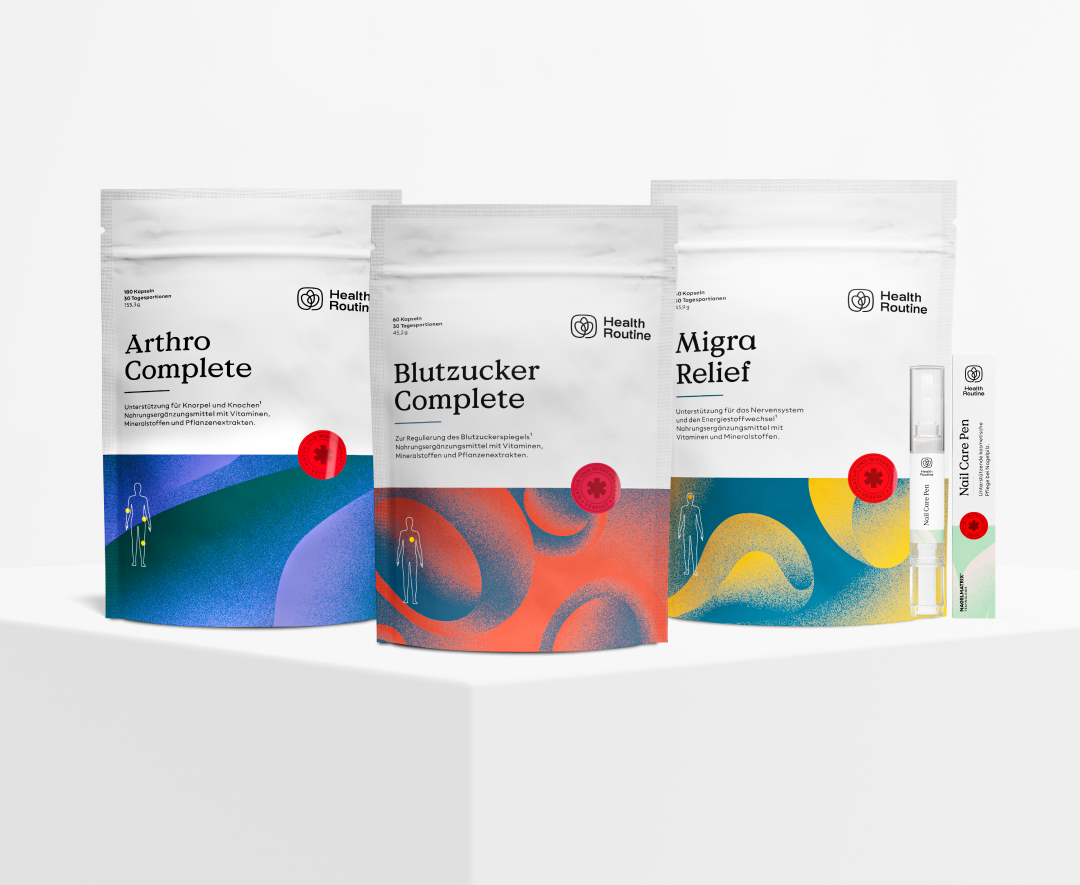The most important things at a glance
-
Foot baths are a tried and tested care ritual with a long tradition – ideal for relaxation and supporting foot care.
-
Learn how different types of baths work and what you should pay attention to when taking a salt foot bath.
-
Discover how Health Routine Foot Bath Salts can contribute to your daily wellness routine.
Everything you should know about foot baths
Foot baths are not a modern invention, but rather have a long tradition . In naturopathy, a salt bath for the feet has been considered a valuable health aid for centuries.
Holistic medicine also sees great potential in this special form of hydrotherapy (water therapy).
In addition to the salt foot bath , there are warm and cold foot baths , as well as alternating and rising foot baths . We'll now show you how these methods differ and what health benefits they can offer!
What do foot baths really do?
As with everything in life, there are huge differences when it comes to foot baths. Whether a foot bath has healthy or more nourishing properties depends largely on how it is used . Both the temperature and the bath additive are crucial.
Salt foot baths are said to have particularly beneficial properties. In folk medicine, they are considered
- valuable support for promoting blood circulation,
- for skin problems
- and for special care for calluses and the like.
Expert advice: But alternating baths and rising foot baths also have their own personal appeal.
Discover our foot bath salts and support the care of your feet!
At Health Routine , the power of nature meets modern science . Knowing the beneficial properties of saltwater foot baths, we have developed a high-quality foot bath salt for you.
The innovative recipe combines the time-honored wisdom of our ancestors with the latest scientific findings, resulting in a unique composition.
Our foot bath salt contains only purely natural ingredients that have proven effective for centuries:
- Sea salt is said to have antiseptic and anti-inflammatory properties.
- Baking soda is considered a valuable support for a balanced acid-base balance.
- Tea tree oil is valued for its cleansing and antibacterial properties.
- Eucalyptus and peppermint provide an extra dose of freshness.
- Menthol has an invigorating and clarifying effect.
- Magnesium sulfate is said to have skin-soothing and nourishing properties.
The selected ingredients form a perfect synergy, meaning they work hand in hand as a well-coordinated team, supporting each other in the best possible way.
Our foot bath salt can help fight fungi and bacteria. It also actively prevents calluses, cracks, and foot odor.
When are foot baths particularly effective?
Foot baths not only have a nurturing component, but have also proven to be a valuable support for health . They are particularly useful for the following ailments :
- Corns
- Nail bed inflammation
- Ingrown toenails
- Athlete's foot
- cornea
- colds
- Urinary tract infections
- Sinusitis
- Swollen legs
- Abdominal discomfort
- Sleep disorders
- intestinal problems
How often is a salt foot bath recommended?
How often a salt foot bath should be performed depends on the application and your personal preferences . If you want to benefit from the beneficial properties of a salt foot bath to help with foot problems such as calluses, corns, and the like, you can do it daily.
Your acid-base balance also benefits from this. Because the The baking soda and sea salt contained in it can counteract over-acidification of the body .
How to achieve the perfect foot bath
To find the perfect foot bath , you first need to know the different methods . We'll introduce them below. We'll also show you which symptoms they've proven effective for:
Warm or cold: Which foot bath is right for you?
Whether a foot bath should be performed with warm or cold water depends not only on individual preference but also on the intended use .
Warm foot bath
| Mode of action | Calming, relaxing, sleep-promoting, blood pressure lowering |
| Implementation | Heat the water to 36-40 degrees Celsius. The application takes approximately 10 minutes and can be done daily. |
| Can support with | Swollen legs, corns, sleep disorders, constipation, sinusitis, calluses |
Cold foot bath
| Mode of action | Stimulating, increases blood pressure |
| Implementation | For a cold foot bath, the water temperature should be between 8 and a maximum of 18 degrees Celsius. The duration of the treatment should not exceed 2 minutes. |
| Can support with | Low blood pressure, extreme heat in summer, nosebleeds, venous diseases |
Ascending vs. alternating foot baths
Rising foot baths and alternating foot baths also have their own special appeal. However, like a cold foot bath, they require some effort .
Rising foot baths
| Mode of action | Vasodilating, promotes blood circulation (also in relation to the mucous membranes) |
| Implementation | For a rising foot bath, the foot tub is first filled with water at approximately 35 degrees Celsius. Over a period of 20 minutes, you gradually add hot water until the water temperature reaches approximately 40-45 degrees Celsius. Your feet can then remain in the warm water for another 5 minutes. |
| Can support with | Cold, urinary tract infections, abdominal discomfort |
Alternating foot baths
| Mode of action | stimulating circulation, promoting blood flow |
| Implementation | For an alternating foot bath, you'll need two buckets. One bucket filled with warm water (approx. 38 degrees Celsius) and the other with cold water (approx. 18 degrees Celsius). The water should also rinse your calves. First, soak both feet in the warm water for about ten minutes. Then, immerse your feet in the cold water for a maximum of 10 seconds. You should repeat this process at least once (or preferably three times). An alternating foot bath should always end with cold water. |
| Can support with | Cold feet, headaches, sleep disorders |
Detoxification through foot baths
Detoxification is on everyone's lips. But what exactly is behind this legendary detox? First of all, you need to know that detoxification is not a modern invention, but rather has a long tradition .
Both natural practices and modern science recognize great potential in this to rid the body of toxins and waste products in a particularly gentle and sustainable way .
By the way, the poisons are not “real” poison, but pollutants that are
- the food,
- the drinking water
- and the air you breathe can enter your organism.
Your body often stores them in connective tissue . But even there , harmful substances can cause long-term damage . This is where a salt foot bath comes in. This time-tested method has been proven effective in folk medicine for cleansing the body.
Sea salt and baking soda, in particular, can play an important role. That's why you'll find both components in our tried-and-tested foot bath salt .
Salt foot bath
| Mode of action | Detoxifying, antibacterial |
| Implementation | Fill a foot bath with warm water and add a high-quality foot bath salt. Allow to soak for 10 minutes. |
| Can support with | Nail bed inflammation, athlete's foot, swollen legs, calluses |
Optimal care after the foot bath
After the foot bath, your feet are perfectly prepared for subsequent care. First , dry them thoroughly , making sure to also pay attention to the spaces between your toes . Afterwards, your feet will benefit from our nourishing and soothing Feet Care Spray .
The balanced formula contains purely natural ingredients such as aloe vera and essential oils (tea tree, lavender, peppermint and eucalyptus oil).
🌿 Aloe Vera provides your feet with extra moisture and can sustainably strengthen the natural nail and skin flora.
🌿 Tea tree oil has a cleansing effect.
🌿 Lavender is considered a valuable oil in naturopathy with skin-soothing and nourishing properties.
🌿 Peppermint and eucalyptus oil provide the necessary freshness.
After spraying, your feet just need to dry briefly , and your care routine is complete. Unless you want to treat your feet even more, then it's worth checking out our guide , "Caring for Your Feet: Expert Tips for Optimal Foot Care ."
What should you pay attention to when taking foot baths?
Foot baths make a valuable contribution to health and well-being . However, there are a few things you need to know.
- Foot baths should not be performed on open wounds.
- If you suffer from cardiovascular disease, you should consult your doctor before using foot baths to determine whether they are suitable for you.
- If you are prone to thrombosis, you should avoid foot baths .
Foot bath with salt: The best expert tips
With the following expert tips, your salt foot bath is guaranteed to be a success :
-
Create a routine: A single application will already give your feet a sigh of relief. But to fully benefit from the soothing properties of a salt bath, you should treat your feet to a foot bath at least once a week.
-
Create a relaxing atmosphere: Make sure you won't be disturbed during your salt foot bath. If you like, you can also create a relaxing atmosphere with candles and music.
-
Pay attention to the right amount of salt: For a foot bath, usually 2-3 tablespoons of salt.
-
Prepare your feet: To optimally prepare your pores for the salt foot bath, you can also exfoliate beforehand.
- Massage your feet: During the foot bath, you can also gently massage your feet to promote circulation. Use your hands or a hedgehog ball in the water.
Conclusion
A salt foot bath isn't just a treat for your feet. While your feet bathe in the soothingly warm water, the rest of your body can also relax. While the stresses of the day slowly fade away, your body can benefit from the supportive detoxification process and recharge.
That's why a salt bath should definitely become a regular part of your daily routine. Create a space for yourself and support your body in the best possible way. It's not just your feet that will thank you! Our foot bath salts have proven particularly effective.
The 100% natural ingredients can optimally support foot health. Often, just taking 10 minutes for a foot bath twice a week is enough. This lays the foundation for well-cared-for and healthy feet.
FAQ
Which foot baths detoxify the body?
The best foot bath for detoxification is a salt foot bath. This has been proven effective in natural medicine for eliminating toxins and waste products. You can find more valuable information on the power of foot baths for psoriasis and how you can use them to treat sweaty feet in our guide. Check it out!
What other additives are suitable for your foot bath?
The foot bath salt can also be combined with other medicinal herbs as desired. Vinegar is also a popular addition, which we'll list here for your convenience. However, you should not combine a vinegar foot bath with salt to avoid possible interactions.
🌿 Rosemary: A foot bath with rosemary can have a stimulating and circulation-enhancing effect. This is particularly beneficial for circulatory problems.
🌿 Chamomile : A chamomile foot bath can improve wound healing. Chamomile is also said to have antibacterial and anti-inflammatory properties.
🌿 Vinegar or apple cider vinegar: A foot bath with vinegar or apple cider vinegar can reduce unpleasant foot odor.
🌿 Lavender oil: supports holistic foot care. Lavender is considered a valuable support for the skin. Due to its calming, nourishing, and relaxing properties, it is also included in our Feet Care Spray included.
🌿 Ginger: Another popular addition to foot baths. This tuber plant is said to promote circulation and have a warming effect—ideal on cold winter days.
🌿 Discover more guides from Health Routine now:
- Athlete's foot vs. nail fungus » These are the differences | Guide
- Treating nail fungus: symptoms, remedies and tips
- Wellness for your feet » The best tips for relaxation
Your medical advice
Our products are not intended to diagnose, treat, cure, or prevent any disease. The information provided in this article is for informational purposes only and is not intended as a substitute for advice from your physician or other healthcare professional.
Furthermore, our products are not a substitute for medications or other treatments prescribed by your doctor or healthcare provider. Regardless of the due care taken, no liability or warranty is assumed for the
- Accuracy,
- topicality,
- completeness
- and availability of the information provided.
No legal claims can be made for any damages potentially resulting from the use and application of this information. Liability claims of any kind are excluded.






